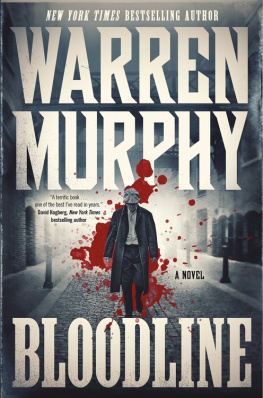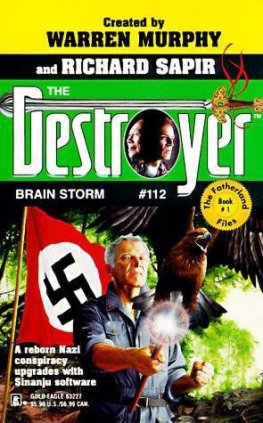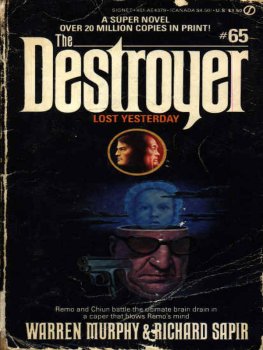DESTROYER #34 CHAINED REACTION Copyright (c) 1978 by Richard Sapir and Warren Murphy
An Apology to the Readers
"From time to time there has appeared an American post office box in the front of these books. Many people, appreciating the glory and wisdom of Sinanju, wrote to that address hoping to be enlightened. Many of those letters were unanswered because Sapir and Murphy were in charge of my answers. Those letters will remain unanswered because of the sloth of Sapir and Murphy, now rich men because of my greatness. I, Master of the House of Sinanju, apologize for the cheap white help."
By his august hand this 177th day of the Year of Dread Wind, 4,875, we are:
-Chiun
"I was answering the letters when Sapir said he didn't like the way I was doing it and would take it over. Since then, your letters have been unanswered."
-W. B. Murphy
"Murphy has known me almost twenty years. Anyone who has known me that long had to know I wouldn't answer the letters.
But that's typical of Murphy-a victim of hope surmounting awesome evidence. All I said to him was that he was doing a lousy job and that I could do better. In any case, most of the letters were for Ghiun. I am hiring a new bookkeeper. If I can find the letters, I may answer them. But since it is only a moral and spiritual obligation, don't get your hopes up. I think I forgot to keep up payments on the post office box. However, I did keep them up for many years, but not one of you thought to write me and say 'good job.' "
-R. Sapir
CHAINED REACTION
CHAPTER ONE
Walker Teasdale III knew he was going to die, knew he had less than a week to live, and knew it made no sense to plan on anything, even his next meal.
He fell into a steady gloom with a vacant stare that no one in Bravo Company could break or even enter.
"Walker, do you know what you're doin', boy? You're gonna get this whole outfit bad marks. That's what you're gonna do, boy," threatened another recruit in the bunk next to his.
Walker was nineteen years old, with sandy hair, a bony build, and a face waiting for manhood to line it with years. His light blue eyes, like empty Caribbean pools, stared nowhere. He rested his chin on his M-16 and answered the intruder from his vision of gloom.
"Ah don' care what happens to the outfit. Ah don' care what happens to anybody. Ah don' care anymore. Ah'm gonna die and that's that."
"How you know you're gonna die, boy?" asked the other recruit, who always seemed to know more than Walker. He was from the big city, Charleston.
Walker had been to Charleston, South Carolina,
1
only twice, once to sell a funny rock he had found to a university feller who was supposed to pay a good price for such things. It was a real good price too, $15.35, and Walker trudged nineteen miles each way to get that price. The second time he had been to Charleston had been to enlist in this special unit that paid for everything and gave you everything.
The other recruits knew Walker was "real country" because he liked the food. Walker thought chipped beef on toast was a treat for months until the other recruits teased him out of it. But he still went back for seconds and ate the leftover portions. He just didn't smack his lips as much anymore. That was all.
Walker cried at Gene Autry movies when the other recruits booed because the show was in black and white.
Walker prayed before he went to bed.
Walker did his calisthenics even when the drill sergeant's white stick wasn't there to prod.
Walker carried the packs of others on forced thirty-mile hikes.
Walker turned himself in for falling asleep on duty.
Walker cried when "Dixie" was played. When the national anthem was played. When Geritol commercials came on television, because it was "so nice to see people in love at such an old age." The old age, for Walker, was thirty-four.
So they laughed at him because he was country. But no one laughed at the rifle range. Walker became the unit sniper in the first two weeks. While other recruits from Chicago and Santa Fe were being told to put the little needle
2
at the front of the barrel between the little V at the back of the barrel and sight the whole thing just under the target, Walker was drilling bull's-eyes. A Walker Teasdale target looked as if someone had taken a rock and pressed out the center.
Walker said there was no secret.
"You jes' put 'er in there real easy, is all."
"But how?" he was asked.
"You jes' do it," Walker replied and he was never able to teach the other recruits how to put out a buzzard's eye, as he called the center of the target.
Everyone teased Walker.
When he asked why the basic training of this outfit was almost two full years, he was told it was that way because he held everyone back.
When he asked where "the nigras" were, they told Walker that a big bear in the hills ate them all up and then everyone rolled on the barracks floor in laughter.
But that question did get some people thinking. Where were the blacks ?
"They ain't smart enough to get into this outfit," said the recruit from Chicago.
"There are some smart niggers," said the recruit from Sante Fe. "They got to have a few. This is the army, isn't it?"
And then the recruits started remembering the strange requirements and questions when they enlisted. Half the questions seemed to be about blacks and how the recruits felt about them.
One said he thought he hadn't stood a chance of getting into the outfit when he answered, "The only good one is a dead one. A dead nigger won't
3
mug you, won't welfare off you, won't mess up your neighborhood. Only thing niggers ever do good in the world is fertilize. And if they had any choice about that, they wouldn't do that either."
"You said that?" asked Walker Teasdale, unbelieving.
"Yessir," said the other recruit.
"Gollee," Walker Teasdale had said. "Ah thought it was against the law not to like nigras."
"Ah hate 'em," said the other recruit.
"Seems a waste of time to hate anybody," said Walker.
"Not niggers. Any time you spend hating them is time well spent."
"Well, ah don't hate nobody," said Walker. "There's good and bad in all kinds."
"Ceppin' niggers is mostly bad," laughed the other recruit, and training became so hard, with the constant repetition of tiring drills, that the strangeness of the unit became less a topic of discussion than survival in the following few days.
There were drills like silence. Five men would be told a secret by the commanding officer and then sent out into the field. This secret would not be mentioned again until two weeks later when the five were brought before the commanding officer, Lt. Colonel Wendell Bleech, a rotund, pink-faced ball of a man with a harsh crew cut and extra large epaulettes on his shoulders, which let the cloth of his military blouse hang fuller over his suet-bloated body.
Colonel Bleech liked to talk about mean and lean. Colonel Bleech liked toasted English muffins with peach jam and sweet butter.
4
Colonel Bleech also liked to punish in front of the assembled unit. He went beyond enlightened rehabilitation. He broke noses and arms and legs and threatened each time, "the next time I get rough."
Colonel Bleech had a riding crop with lead balls laced into the flattened pommel. Colonel Bleech pointed to two of the recruits.
"The secrets I told you are no longer secrets. They have come back to me. I swore you to secrecy. Do you know the most important thing in a man's makeup and character is his word? You have violated your word. You have raped your word. You have desecrated your word. Now what do you two have to say for it?"
They said they were sorry.
"Now, see, men, I have a problem," said Bleech. He liked high riding boots and balloon riding pants. He looked like a tan pumpkin. Anyone who hadn't seen him kick prostrate recruits in the groin would think he was downright cherubic. He slapped his crop against his shiny riding boots.
Next page



